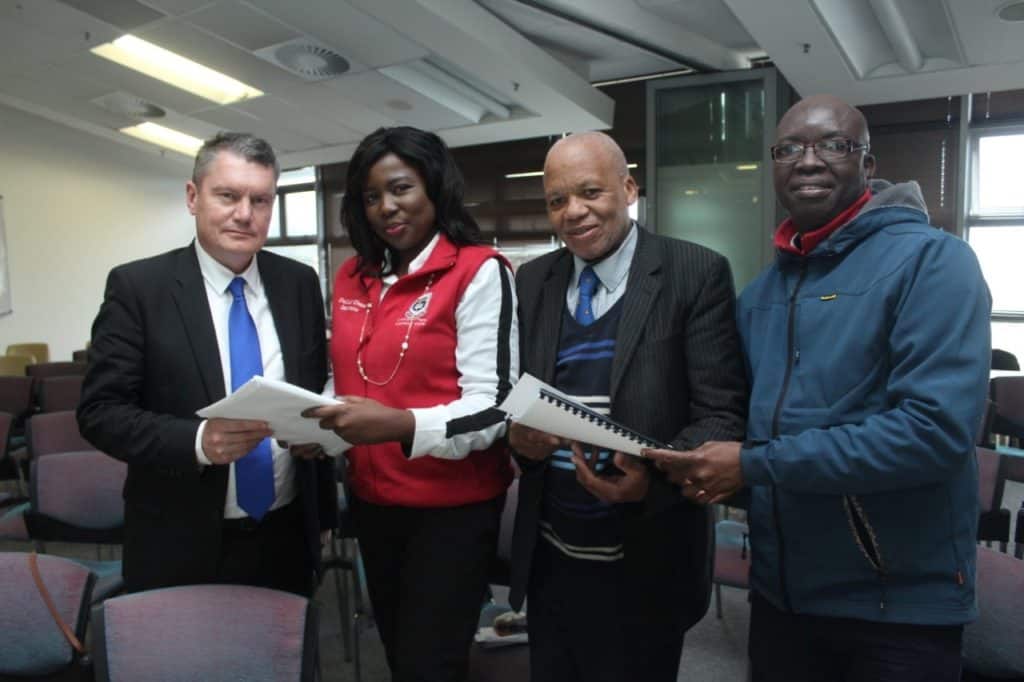
Commissioners André Gaum (far left) and Commissioner Sibanyoni (second from right) of the Human Rights Commission receive a petition on student hunger from Ms Funmilola Adeniyi (second from left) and Professor Ebenezer Durojaye of the Dullah Omar Institute at UWC.
To raise awareness about the ‘invisible crisis’ of hunger and food security among students at tertiary institutions in South Africa, the Dullah Omar Institute (DOI) at the University of the Western Cape (UWC), in collaboration with the DST-NRF Centre of Excellence in Food Security, today presented a petition to the South African Human Rights Commission (SAHRC).
Professor Ebenezer Durojaye of the DOI presented the petition to two Commissioners of the SAHRC – Commissioner André Gaum (responsible for education in the Commission) and Commissioner Sibanyoni (responsible for food security) – at the latest in a series of advocacy meetings of the DOI’s Access to Food for Students Project, supported through the CoE-FS.
In the petition, the DOI demanded that the SAHRC:
- Conduct an urgent nationwide inquiry into the state of food and nutrition security and the constitutional fulfilment of the right to food of students within tertiary institutions;
- Report timeously the findings of such inquiry to Parliament, making concrete recommendations on ways the different government institutions and departments, can address this issue, both in the short-term and long-term; and
- Make concrete legislative and policy recommendations to Parliament to ensure the fulfilment of the right to food of students within tertiary institutions.
In a keynote he delivered to the meeting, Gaum argued that hunger can erode the optimism and promise of a university education. “Many students enter into the higher education system with an overwhelming sense of pride, excitement and hope,” he said. “They are driven by popular sentiments that the future is in their hands, and that they can achieve anything they set out to do.”
Ensuring access to education is not merely about ensuring access, he added. “Because what does equitable access mean without equitable opportunities of success?”
It is recognised that while access to higher education has been substantially increased post-1994, the higher education system remains largely inequitable, Gaum noted.
Against that backdrop, reports that some 30% of students – and possibly as many as 65% at some institutions – in South Africa either regularly go hungry or are food insecure is further cause for concern. Hunger can impact on their ability to focus, as well as their physical and mental health and wellbeing, he said.
“While there have not been comprehensive assessments of the impact of poverty on throughput rates – with around 50% of students dropping out of university within the first three years – it is highly likely that poverty serves as not only a contributing factor, but a dominant one.”
What’s more, access to food impacts on other human rights, including dignity, health, and education, he added. “The right to food is an essential human right in and of itself. Not only is adequate nutrition an essential element of living a life of dignity, but it is essential for basic survival.”
In addition to the petition it handed to the SAHRC, the DOI’s Access to Food for Students Project is drawing up a set of proposals that it hopes will shape national policy.
related Articles
Greater Cape indigenous foods back on the map with groundbreaking partnership
Pickled veldkool. Photo: Loubie Rusch. A groundbreaking new partnership between the DSI-NRF Centre of Excellence in Food Security (CoE-FS), Local…
Localised food systems key to economic inclusion and environmental sustainability
Photo by Ashraf Hendricks. Localised food systems key to economic inclusion and environmental sustainability by Neil Overy, Daily Maverick May…
Community of Practice renamed in keeping with its COVID-enforced remaking
When, in 2017, a group of scholars chose to christen a new initiative within the DSI-NRF Centre of Excellence in…



